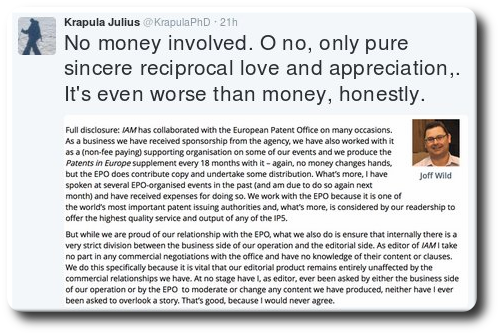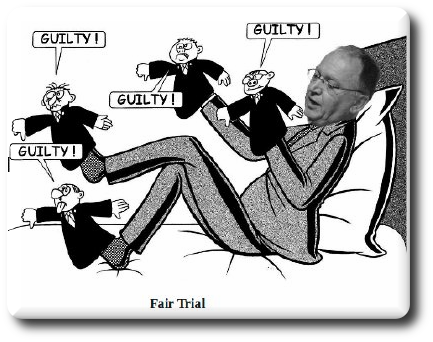12.21.15
The Forgotten History of IAM ‘Magazine’ as EPO Management’s Megaphone and EPO Union Basher

Summary: In an old letter from the Staff Union of the European Patent Office (SUEPO), conflicts of interest in the Council, the decreasing quality of patents, the attacks on workers’ rights as well as many other issues were already openly discussed
On Saturday we showed that IAM 'magazine' was indirectly paid by the EPO to organise a pro-UPC event. We have received some private feedback about that article, neither from EPO staff nor from unions. There are many people in Europe and abroad who are seriously concerned about what’s happening inside the EPO these days. The whole world is impacted by patents, albeit their impact is mostly invisible to people (market prices are commonly what’s visible to common men and women).
“There are many people in Europe and abroad who are seriously concerned about what’s happening inside the EPO these days.”Regarding the Saturday article, one person drew our attention to something from more than 7 years ago. “From the archives,” said this person, there is a 2008 letter where “SUEPO replies to Joff Wild.” Wild is the main person behind IAM ‘magazine’, which we wrote more and more about in recent weeks because we suspect it is climbing into bed with the EPO more often than before. Articles on this subject include:
- IAM Biased: How IAM ‘Magazine’ Glorifies Patent Stockpiling
- Media Alert: IAM ‘Magazine’ Does Not Protect Sources
- IAM ‘Magazine’ Protects Patent Trolls, Blocks People Who Disapprove
- Patents Roundup: IAM’s Claims About India, Lawyers’ Patent Bias, ITC for Microsoft, and PTAB Against Kyle Bass
Having retrieved the letter from SUEPO, we would like to show what IAM did at the time (emphasis in larger fonts), together with Brimelow, the EPO’s President at the time:
Zentraler Vorstand . Central Executive Committee . Bureau Central
15.12.2008
su08163cl – 2.04.6b/6.Re.: IAM blog – Comments on SUEPO
Dear Mr. Wild,
In your blog you have repeatedly challenged SUEPO (Staff Union of the European Patent Office) to provide evidence in support of its claims that:
• there is a drive towards decentralisation,
• the quality of the patents granted by the European Patent Office is threatened by the policies of its administration,
• the system is distorted away from the interests of the users (in our opinion mainly towards those of the national patent offices), and
• European Patent Office staff is genuinely frustrated.“In fact, officials have recently been threatened with disciplinary actions for their alleged involvement in SUEPO publications.”You claim that SUEPO is dishonest in the sense that the criticism raised is predominantly motivated by a degradation of the working conditions at the European Patent Office. We would of course like to reply to this challenge, however, our ability to do so is severely limited by the restrictive interpretation of the EPO administration that staff may not publish internal information that is not already public. In fact, officials have recently been threatened with disciplinary actions for their alleged involvement in SUEPO publications. In the following we therefore limit ourselves to summarising material which has already been published
Much of the material we cite is also available on the SUEPO website (www.suepo.org).
1. Frustration of EPO staff
“It was reported that in a survey conducted by the staff union in April 2004 among some 1,300 patent examiners, more than three-quarters agreed with the statement that productivity demands from the EPO’s managers did not allow them to enforce the quality standards set by the European Patent Convention.”The frustration of the EPO staff about the way their Organisation is governed is not new and is very well documented. One of the earliest publicly available reports on staff discontent as expressed in staff surveys comes from none other than the highly reputed scientific journal Nature (“Pressured staff lose faith in patent quality”, Alison Abbott, 3 June 2004, Nature vol. 493). It was reported that in a survey conducted by the staff union in April 2004 among some 1,300 patent examiners, more than three-quarters agreed with the statement that productivity demands from the EPO’s managers did not allow them to enforce the quality standards set by the European Patent Convention. And 90% said that they did not have time to keep up to date with advances in their scientific fields.
In a staff survey of 730 examiners, undertaken by the EPO in 2004, only 9% said they believed that the management was “actively involved in improving quality”. The staff surveys subsequently conducted by the EPO in 2006 and 2008 produced similar results. The cause of staff discontent is clearly not the benefit package since the vast majority staff reported their satisfaction with pay and rewards in the staff survey cited in
the above-mentioned Nature article, and have continued to do so in subsequent surveys. It should furthermore be noted that the earliest warning signals were issued under President Kober, at a time when the staff benefit package was not under discussion (see, for example, the New Scientist article “Go-slow at patent office puts inventions on hold” of 19 February 2000).
“”Regarding the 2008 Staff Survey, the German magazine “Spiegel” reported that staff trust in the Administrative Council was at an exceptionally low level of just 4% (“Tausende Patentamt-Mitarbeiter sind genervt von Chefetage” link Spiegel Online to doc on our website 07.06.2008).The 2004 Staff Survey documented strong dissatisfaction at the difficulties in delivering quality work, and a lack of trust in the Office management in general and the Administrative Council in particular. Regarding the 2008 Staff Survey, the German magazine “Spiegel” reported that staff trust in the Administrative Council was at an exceptionally low level of just 4% (“Tausende Patentamt-Mitarbeiter sind genervt von Chefetage” link Spiegel Online to doc on our website 07.06.2008). This information is
correct. We refer you to CA/93/07 for our interpretation of the similar lack of trust in the Council recorded in the 2006 Staff Survey.One factor behind the lack of trust towards Office management, at least amongst examiners, is continuous changes in the reporting system resulting in an ever-increasing focus on quantity at the cost of quality, and this in the face of an obvious increase in the size and complexity of the incoming applications (see CA/73/05 “The increased voluminosity of patent applications received by the EPO and its impact on the European Patent System”), a constant increase in the volume of prior art, and what we experience as a decline in willingness to cooperate from many applicants.
“One factor behind the lack of trust towards Office management, at least amongst examiners, is continuous changes in the reporting system resulting in an ever-increasing focus on quantity at the cost of quality…”Research International, the consultants commissioned to undertake the last three staff surveys, already identified in 2004 a huge divide between staff and senior management. They referred to this divide as a culture conflict: on the staff side a culture of quality and on the management side a culture of quantity.
2. Quality of the patents granted by the EPO
SUEPO has consistently and continuously claimed the need for high quality search and examination work, based on first rate classification and documentation, and followed by a comprehensive and high-quality patent information service, in the interest of applicants and the public. Already in 1997 SUEPO issued a first position paper on patent quality, followed in 2002 by the SUEPO working paper “A Quality Strategy for the EPO” and in 2004 by the SUEPO position paper “Quality of Examination at the EPO”. The consistency of approach is evident when consulting subsequent SUEPO papers and interventions on the topic of quality, most recently in 2006 in SUEPO’s position on the questionnaire of the European Commission on the patent system in Europe.
“Already in 1997 SUEPO issued a first position paper on patent quality, followed in 2002 by the SUEPO working paper “A Quality Strategy for the EPO” and in 2004 by the SUEPO position paper “Quality of Examination at the EPO”.”It remains SUEPO’s conviction that the strength of the EPO, and the continued justification for a centralised European Patent Office, resides in the critical mass of staff with the specialised technical, legal, procedural and linguistic knowledge necessary to search and examine patent applications accurately and completely. This is a prerequisite to issue patents with a very high presumption of validity. A presumption of validity is an indication of a confidence in the fairness of the patent system, and fairness is a requirement to ensure that the patent system serves the collective interests of society as a whole rather than those of specific groups.
This is undeniably linked to working conditions at the EPO and therefore of central interest to staff. First, the meaning and purpose of the contribution staff can make to society is undermined if the rights granted are not proportionate to the contribution made by that applicant. Secondly, to achieve the standard of quality required the Office must be able to attract and retain highly qualified scientists, engineers, lawyers and formalities staff, with the necessary language skills. Thirdly, in order to maintain high
public confidence in the impartiality of the EPO all nationals must be fairly represented, requiring conditions of employment which are sufficiently attractive to persuade staff to expatriate themselves and their families.
“It is, however, rather silent on what measures have been taken to safeguard or increase the quality, and entirely silent on e.g. recent developments in the error rates in granted patents.”In statements directed to the outside world the administration stresses its commitment to quality. It is, however, rather silent on what measures have been taken to safeguard or increase the quality, and entirely silent on e.g. recent developments in the error rates in granted patents. One potentially quality-enhancing measure which has been implemented recently is to increase the “points” allocated to examiners for refusing an application. This partially compensates the higher work input involved in a refusal. However, this change is not reflected at an organisational level, leaving the office with conflicting priorities. Initial feedback also suggests that this measure has resulted in an increase in the proportion of applications which are refused. If true such results support the long held view of staff that the management systems in the EPO have created a bias towards granting. While SUEPO nonetheless appreciates this measure, it should not be forgotten that it was a compromise reluctantly accepted by management following fierce opposition against the latest round of changes to the productivity reporting system, at a cost of 18.000 strike days. In general, the focus of the Office (and Council) remains on productivity and production rather than on quality. This is a source of extreme frustration for staff – at the end of the day, it is the quality of the “end product” which counts. The staff of the EPO are not the only ones who are concerned about the quality of their work. As an example, we refer to a recent report by the British industry association TMPDF.
3. Drive towards decentralisation
A drive towards decentralisation has been recognised very early in the history of the EPO, see e.g. Bossung (2001) on the (lack of) political leadership. However, this tendency has increased in recent years. SUEPO is not alone in noticing this and in opposing it. For a very recent contribution to the debate see the latest entry on Axel Horn’s IP::JUR blog. The decentralisation process received renewed impetus with the Administrative Council’s approval of the proposals contained in CA/120/06, CA/121/06, CA/122/06, CA/123/06 and CA/124/06 detailing the European Patent Network (EPN). While some aspects of these initiatives are potentially beneficial to the users of the European patent system, those same users have stated that they do not want a decentralised patent system and have already “voted with their feet”.
“It is instructive to consider the reaction of applicants to the decision of the Council to stop the EPO performing “special searches” and to force applicants to choose between various national offices for this service (“Special searches handed over to national patent offices”).”The “Utilisation Pilot Project” referred to in CA/121/06 above was initiated to test potential gains in efficiency through the utilisation by EPO examiners of the results of searches carried out in certain national offices (Denmark, UK, Austria, Germany). However, interest was so low that the voluntary nature of participation was abandoned. More than 1000 files have now been processed and the results compared. We have seen the raw results, which do not support the claimed efficiency gains. Information on the pilot outcome pilot is available in the documents CA/147/08 and CA/147/08 Add. 1. Nevertheless, we know that the Project Board, which includes representatives of the participating national offices, claims such gains, seemingly regardless of the results.
It is instructive to consider the reaction of applicants to the decision of the Council to stop the EPO performing “special searches” and to force applicants to choose between various national offices for this service (“Special searches handed over to national patent offices”). This was part of the proposals of CA/123/06. The EPO was flooded with requests for special searches before the deadline expired, often accompanied by letters insisting that the search be performed by the EPO. No information is available about the subsequent handling of special searches by the national offices, for example, numbers requested before and after the change, feedback from applicants, etc. We
fear that this lack of respect for the legitimate interests of applicants risks becoming the hallmark of the EPO.
“We fear that this lack of respect for the legitimate interests of applicants risks becoming the hallmark of the EPO.”Although the original concept of the European Patent Network was firmly based on the principle of voluntary participation by applicants, we believe that it is no longer intended to adhere to this principle. In view of the lack of interest from applicants for both the “utilisation pilot project” and “special searches” initiatives, and the resulting reactions of many Administrative Council delegations, the impression is that user participation in
such EPN projects will de facto become compulsory (or “office-led” as the EPO management puts it).4. Conflicts of interest in the Council
The heads of the national delegations in the Administrative Council are almost without exception heads of their respective national patent offices. For many of the national offices their 50% share of the renewal fees constitutes a very substantial proportion of their annual budget (in several cases well over 50%). In their function as heads of national offices these heads of delegation thus have an interest in having many patents granted, and having them granted quickly.
“The heads of the national delegations in the Administrative Council are almost without exception heads of their respective national patent offices.”Again SUEPO is not alone in identifying and publicizing this problem. In the “Interviews for the Future” collected in 2006 by the EPO as part of the Future Scenarios project, Thierry Sueur (Vice-President of Air Liquide, responsible for Intellectual Property, and Chairman of BusinessEurope’s Working Group “Patents”) and Jacques Combeau (Intellectual Property, Air Liquide, and delegate for Business Europe at the
Administrative Council) famously said: “I am convinced that the way the EPO is managed today (by its Administrative Council) is such that it will mean either the death of the EPO or its transformation into a cash machine.” The interview with Dr. Ingrid Schneider also makes highly interesting reading in this respect.Since 2006 the Administrative Council has taken a decision that is clearly not in the interest of the Organisation, by transferring a total of 720 million EUR in liabilities from the Contracting States (in several cases from the national patent offices directly), to the European Patent Organisation despite the Organisation allegedly being in serious financial difficulty.
5. Motivation of SUEPO
SUEPO is a staff union. It is the very purpose of a union to defend the interests of the staff that it represents, including their financial interests, therefore, we confirm that SUEPO will continue to defend the conditions of staff. However, when conflicts started in the mid 1990s (under President Kober) the staff’s benefit package was not under discussion, the issue was productivity, and staff considered that the measures taken would jeopardise quality. Under President Pompidou staff trust in its governing bodies decreased further, albeit not with regard to attacks on the benefit package.
“Under President Pompidou staff trust in its governing bodies decreased further, albeit not with regard to attacks on the benefit package.”Presently, under President Brimelow, staff benefits are being put into question. The thinking behind this appears to be that financial measures (e.g. performance related pay, loss of career rights) are needed to coerce staff to produce more. This reflects a commonly expressed view of our management that the quality issues raised by staff are a proxy for workload disputes. This view misunderstands completely staffs’ concerns with quality.
In an interview with you, Ms. Brimelow referred to “the “escalator” model of pay that currently exists” in the EPO. This is the sort of statement that would make any union
jump. However, the new pension scheme being introduced in 2009 will primarily affect future staff. The administration has repeatedly stated that staff in place will not be affected. Future staff, however, will be confronted with a pension system that SUEPO considers both unattractive and socially unjust (at least by European standards) and that – according to statements of the administration – could lower their pensions by 22%. Our fear is that this will provide a disincentive to prospective, highly-qualified staff which the EPO needs to recruit in the future in order to safeguard quality standards.
6. Conclusion
To summarize: although SUEPO will of course resist attacks on the working conditions of staff , it has been calling for actions in order to defend the quality of the work of the Office, which it considers to be of paramount importance to the European public and industry, and to defend the interests of future staff. SUEPO will continue to fight against the trend towards a high volume low quality patent system, since this seeks to reduce the work of staff to that of automatons serving the limited financial interests of some groups rather than the interests of society as a whole.
“SUEPO will continue to fight against the trend towards a high volume low quality patent system, since this seeks to reduce the work of staff to that of automatons serving the limited financial interests of some groups rather than the interests of society as a whole.”Current staff have paid a high price, not only in the form of pay deductions due to
strikes, but also the social unrest and associated stress that this conflict causes. Considering the importance of these issues SUEPO continues to be astonished by the apathy of important decision makers with regard to the erosion of values within the patent system, and continued lack of real public debate on the matter.In the circumstances, we consider that your suggestion that SUEPO is acting out of self-interest is disingenuous, and puts in doubt the independence and impartiality of your reports.
For your information, we intend to make this letter available to all EPO staff.
Yours sincerely,
Mr. A. Wansing
SUEPO central executive committeeMr. E. Daintith
SUEPO MunichMr. P. Bocking
SUEPO BerlinMr. J. Areso
SUEPO The HagueMs. C. Schuhmann
SUEPO Vienna.cc A. Brimelow
Explaining this to non-technical patent lawyers may mean it will just fall on deaf ears. Either way, recently we saw more evidence of pressure on examiners to speed up or lose their vacation. There is also accelerated examination for large businesses. A lot of what SUEPO wrote almost a decade ago is still applicable and it’s probably getting worse under Battistelli. He is trying to crush SUEPO itself (the messenger). As noted in the letter above, a culture of secrecy inside the EPO (limiting access to information by the media, using threats) was part of the problem. █







 Summary: A closer look at École nationale d’administration (ÉNA) and its loathsome role in French politics, in addition to some remarks about ÉNA alumnus Battistelli with his poor performance in a zero-competition sector (he has got a monopoly) and made up figures, which give only an illusion of success
Summary: A closer look at École nationale d’administration (ÉNA) and its loathsome role in French politics, in addition to some remarks about ÉNA alumnus Battistelli with his poor performance in a zero-competition sector (he has got a monopoly) and made up figures, which give only an illusion of success















 Content is available under CC-BY-SA
Content is available under CC-BY-SA